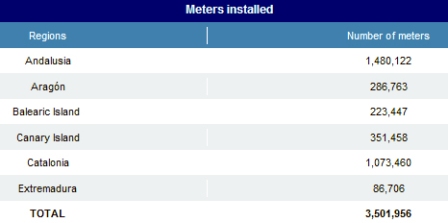Madrid-based Endesa—the largest utility in Spain and a subsidiary of the Italian electric provider, Enel—continues to roll out remote management in Spain, with over 3.5 million smart meters installed at residential customer premises in the regions it serves as an electricity distributor, including Catalonia, Aragón, the Canary Islands, the Balearic Islands, Andalusia and Extremadura.
The rollout is progressing rapidly throughout Spain. Therefore, based on the company’s current smart meter installation rate, Endesa already has installed meters at 30.5 percent of its customer’s residences—and currently is leading the way among European utilities.

The goal is to replace a total of 13 million legacy home meters. These new meters are being operated from Endesa’s Remote Management Operations Centre, which has been operational since 2010.
Remote meter management is the base technology for the development of smart grids, offering solutions for the development of smart cities, integration of distributed electricity generation systems, the incorporation of renewable energy into the grid, integration of electric vehicle recharging, as well as management of public lighting.
The Enel Group has smart city projects in Spain (Smartcity Málaga and Smartcity Barcelona) and in Italy (Bari, Genoa, Turin, Cosenza and L’Aquila), and is also working on smart grids on the Spanish islands of El Hierro and La Graciosa. This system has also been successfully exported to the Cidade Inteligente Búzios (Brazil) and Smartcity Santiago (Chile) projects, which are the first of their kind in Latin America.
Benefits of Remote Management
Remote meter management enables customers to monitor their electricity usage in real time, select the time-of-use (TOU) rates that best suit their needs and switch their appliance operation to off-peak hours, to take advantage of those rates if they wish.
Switching a traditional meter with a smart meter is, for customers, entirely free of charge. Customers continue to rent their meters under the legally established tariffs that are applicable to all utility companies.
In addition to the equipment installed at residential customer premises, Endesa is setting up concentrator devices in all its low-voltage (LV) transformer centers. Such devices operate meters automatically and remotely, communicating with them via the grid and using a power line communications (PLC) protocol. Data encryption and authentication fully ensure the privacy and security of all the information transported via the network.
This PLC protocol has been available to the industry since 2010 via the Brussels-based, not-for-profit Meters and More Association. This association currently has 35 members, representing a balanced sample of the various stakeholders involved in the smart metering field at the global level. Meters and More has become a widespread protocol for remote meter management and smart grids, which are in the process of being standardized across Europe by CENELEC (the European Committee for Electrotechnical Standardization). To support this process, Meters and More recently established a technological liaison partnership with CENELEC’s Technical Committee 13 (CLC/TC13).
Remote meter management also entails benefits for the overall electricity system. It provides reliable and constant information on network performance, enhancing operational decision-making, and improves the system’s overall efficiency, helping to avoid overloads. At the same time, remote management helps reduce distribution losses and enhances management of energy demand, improving energy efficiency and reducing CO2 emissions.
Edited by
Alisen Downey